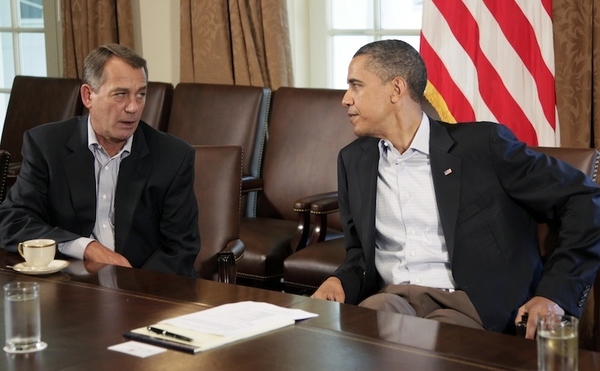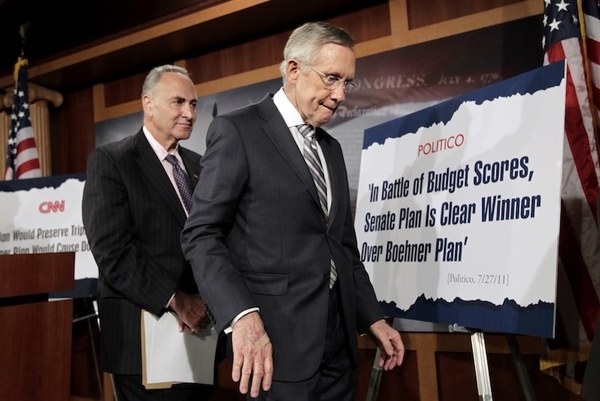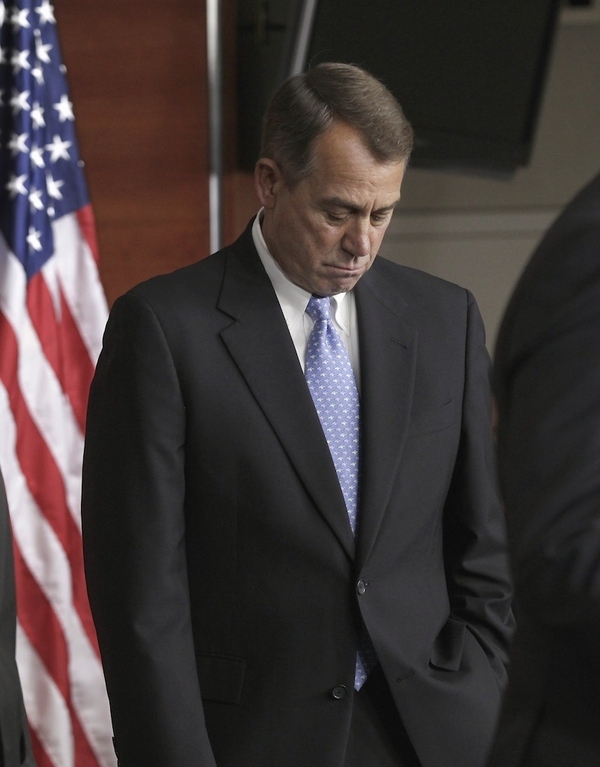John Boehner Is Terrible At His Job
Unable to control his Republican caucus amid a Tea Party revolt, House Speaker John Boehner was forced to indefinitely postpone a vote on his debt ceiling bill. The abrupt move to pull the bill from consideration was a stunning setback for Boehner, shifting emphasis over to the Senate Democratic plan put forward by Harry Reid and supported by President Obama.
-

House Speaker John Boehner of Ohio takes part in a news conference on Capitol Hill in Washington, Thursday, July 28, 2011, to discuss the debt crisis showdown. (AP Photo/J. Scott Applewhite) WASHINGTON--A revolt by conservative House Republicans stalemated efforts by the party's leadership to pass a bill raising the nation's debt ceiling, with Speaker John A. Boehner and his aides calling off a scheduled vote after determining they were on the verge of a humiliating defeat. With just days remaining before the federal government runs out of money to pay its bills, the setback weakened Boehner, R-Ohio, and strengthened the hand of Democratic congressional leaders in final efforts to forge a compromise to avert a threatened economic crisis. In the Senate, Majority Leader Harry Reid of Nevada has been holding discussions with Vice President Joe Biden and Republican Leader Mitch McConnell of Kentucky. Reid is seeking a potential compromise that could win bipartisan backing for bill to raise the $14.3 trillion debt ceiling. Reid plans to keep the Senate in session through the weekend as those talks continue, aides said. The setback was the second time this week that conservative opposition forced Boehner to postpone a vote on his debt-ceiling proposal and dramatically illustrated the power of "tea party" conservatives to upend the GOP establishment.
-
-
The late-night decision came after hours of frantic, but so-far unsuccessful, efforts at arm-twisting, with House leaders ushering wavering members into leadership offices to meet with the speaker, Majority Leader Eric Cantor, R-Va., and Majority Whip Kevin McCarthy, R-Calif. The efforts began early in the afternoon as Boehner's chief of staff, and then the speaker himself, pulled members off the floor for private conversations, at least once with the powerful Appropriations Committee chairman, Rep. Hal Rogers, R-Ky., in tow. A dazed-looking undecided freshman listened to overtures from a smiling, gesticulating member of the leadership team. A committee chairman wrapped his arm around a congressman who was leaning no, as other members surrounded the man. On the other side of the argument, influential tea party groups and their allies urged House conservatives to stand firm. Sarah Palin released an open letter to House freshmen with bold-faced exhortations to "stick to the principles that propelled your campaigns" and "never forget the people who sent you to Washington." Rep. Michele Bachmann, R-Minn., declared she would not be "party to deceiving the American people yet again" and urged fellow Republicans to vote no.
-

President Barack Obama meets with House Speaker John Boehner of Ohio, left, in the Cabinet Room of the White House, Saturday, July 23, 2011, in Washington, to discuss the debt. (AP Photo/Carolyn Kaster) With no Democrats pledging to support Boehner's bill, he could afford to lose only about two dozen of his members. As the evening wore on, it became clear that he was falling short. Boehner is "asking for my vote," Rep. Louie Gohmert, R-Texas, said as he emerged from one meeting. "I'm still where I was before. I'm still bloodied-and-beaten no." Others tried to avoid the arm-twisting. Caught walking near Boehner's office, Rep. Jeff Duncan, R-S.C., said he wasn't going in for a meeting. "I'm going in to pray about this in the chapel," he said. "I'm going to pray for our leaders. They need it." More secular issues also may have been in play. South Carolina Republicans had demanded a vote on a measure that would end a controversial federal labor-law proceeding involving a proposed Boeing Corp. plant in their state. Late in the evening, still about eight votes short, Boehner and his allies considered changes to the bill. One point of contention has been that the bill would allow billions of dollars for the Pell Grant program, which provides scholarships to low-income college students. That's a problem for conservatives who want to cut not add money. Cutting Pell Grants could win over a few conservatives, congressional officials said.
-

Senate Majority Leader Harry Reid of Nev., right, followed by Sen. Charles Schumer, D-N.Y, left, leaves a news conference on Capitol Hill in Washington, Wednesday, July 27, 2011, after talking about the conflicting plans to deal with the debt crisis. (AP Photo/J. Scott Applewhite) Another issue is the conservative desire for a balanced budget amendment to the Constitution. The Boehner bill only requires a vote on an amendment in both chambers. Many conservatives would rather see a requirement that the amendment pass before the debt ceiling could be raised. House GOP aides indicated that Boehner would try again for a vote on Friday. Boehner had argued to his caucus that failure to pass a bill in the House would eliminate their leverage in efforts to avert a first-ever federal default. Congressional leaders repeatedly have said they will not allow a default, which could course through the U.S. and global economies as of Aug. 2, when the Treasury says it will run short of money. Democratic leaders in the Senate plan to proceed with their own plan, aiming to produce a bill that can pass the Senate with a bipartisan majority, then come back to the House floor and pass with Democratic support. Despite the setback Boehner suffered, that ultimate deal is likely to resemble his proposal in several key ways. Boehner's bill and a competing measure proposed by Reid have broad similarities, "so you can see the zone of compromise here," David Plouffe, senior adviser to President Barack Obama, said hours before the House called off its vote.
-

House Speaker John Boehner of Ohio, pauses as he and other Republican leaders talk to reporters about the debt crisis showdown during a news conference on Capitol Hill in Washington, Thursday, July 28, 2011. (AP Photo/J. Scott Applewhite) Both bills claim to reduce spending over the next decade by somewhat more than $2 trillion an amount considerably smaller than the "grand bargain" Obama and Boehner had tried to reach. Both would make their reductions in two stages. The first stage would impose about $900 billion in spending cuts over the next decade by capping future budgets for federal agencies. The second stage would involve a special congressional committee that would be directed to propose a package of spending cuts and, possibly, tax increases that would reduce the deficit by about another $1.5 trillion. The most contentious difference between the two is that Boehner's plan would raise the debt limit in two stages. It would require that Congress pass the second round of deficit cuts before allowing the second increase in the debt ceiling, meaning the nation would see a repeat of this summer's debate around Christmas and into the new year. Obama has opposed any plan that would have Congress return to the issue, fearing that a further round of debate on the debt ceiling in an election year would be even more partisan than this summer's has been. Reid's plan, by contrast, would raise the debt ceiling enough to carry the government through 2012. The compromise talks have focused on several proposals for elaborate "trigger" mechanisms that would try to guarantee that additional deficit-reduction measures would be voted on, but would not hold a debt ceiling hostage to those votes. The goal is to bring aboard the seven Republicans who would be needed to avert a filibuster and pass a proposal in the Senate. That body would then vote sometime next week, as the final hours ticked down, with Reid counting on the pressure of imminent financial turmoil to persuade reluctant members of both houses to go along.
